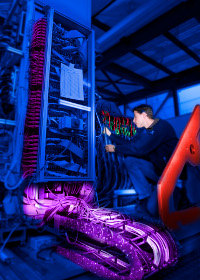 |
 |
|||||||||||||
|
|||||||||||||
|
|||||||||||||
The Advanced European Infrastructures for Detectors at Accelerators (AIDA) proposal has received top grades from the European Commission, meaning that the multi-disciplinary multi-institutional detector development project will definitely go ahead. Out of 47 submitted proposals, AIDA came second with a score of 14.5 out of 15. The only catch is that the EC cut the proposed funding from 10 to 8 million Euros, reducing the full funding to just under 28 million Euros over four years. The project partners are now in the process of redefining the scope of the project in order to match the new budget, but are planning to keep as much as possible to the originally foreseen work. The coordinators and the EC are currently in a negotiation phase and the starting date of AIDA is expected for early 2011. Detector development for linear colliders plays major role in the project. AIDA puts a lot of emphasis on accuracy, supporting R&D for particle-flow calorimetry and test beam facilities, especially for dedicated engineering studies on materials and alignment. There are also plans for investigating new methods such as power pulsing to save energy and improve heat dissipation. Time stamping R&D, a big issue for the Compact Linear Collider Study (CLIC) detectors, also forms part of linear collider work within AIDA. Linear collider studies are part of almost all nine work packages, which also look into detector development for LHC upgrades, b-factories or neutrino facilities. Detector R&D is clearly a big topic at universities and laboratories across Europe: AIDA has 32 'partners' that represent more than 70 European universities, research institutions and labs from 20 countries. It is unique in its scope, both in terms of the institutes and the research involved. The negotiation phase with the EC will last until July, followed then by contract signing. CERN, the coordinating institute, expects the project to start officially at the beginning of next year. -- Barbara Warmbein
|
|||||||||||||
| © International Linear Collider |
